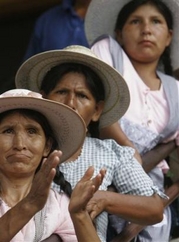Entered into the database on Wednesday, December 28th, 2005 @ 21:54:59 MST
President-elect Evo Morales will reject U.S. economic and military
aid if the United States requires continued coca-eradication efforts to get
the money, a close aide to the former coca growers' leader said Tuesday. Morales also plans to withdraw Bolivia's military from anti-drug efforts and
leave the job to police, said Juan Ramon Quintana, a member of the Morales'
transition team. Morales, who won Bolivia's presidency Dec. 18 with a decisive 54 percent of
the vote, campaigned on promises to stand up to the U.S. on the coca issue and
the eradication of coca plantations. Coca eradication is a condition for aid
from the United States, which gave Bolivia $91 million in 2005. The decision was made "mainly for reasons of sovereignty," said Quintana,
who described Bolivia's Special Force to Fight Drug Trafficking as "an
appendix" of the U.S. Drug Enforcement Administration. Morales' election added momentum to South America's leftward tilt where several
leftist leaders are now in power. He has also forged strong ties with Cuba's
Fidel Castro and Venezuela's Hugo Chavez, both outspoken U.S. critics. Morales also announced that he will travel Friday to Cuba to meet with Castro
as the first stop in a world tour that will include visits to Europe, China,
South Africa and Brazil before assuming office. "We have a lot of invitations from governments from presidents,"
Morales said Tuesday. The United States also has congratulated Morales on his victory and said that
relations between their countries will depend in large part on whether the president-elect
respects democratic norms. A U.S. embassy spokesman said Tuesday that there
would be no official comment on the announcement that Bolivia will forego financial
aid that comes with anti-drug strings attached. Bolivia's national police commander, Gen. David Aramayo, acknowledged that
the United States offers "important support" in the coca-eradication
campaign, but insisted that his force has been ultimately responsible for the
drug unit. Coca is used to make cocaine, but it also has legal religious and medical uses.
Indians also chew it to fight fatigue. Morales once wrote on his Web site, "Thanks to coca, we've made it through
the endless suffering caused by the white man's infamous war on drugs."
But he's also made a point of saying he'll crack down on cocaine trafficking
while protecting the plant's traditional uses.
